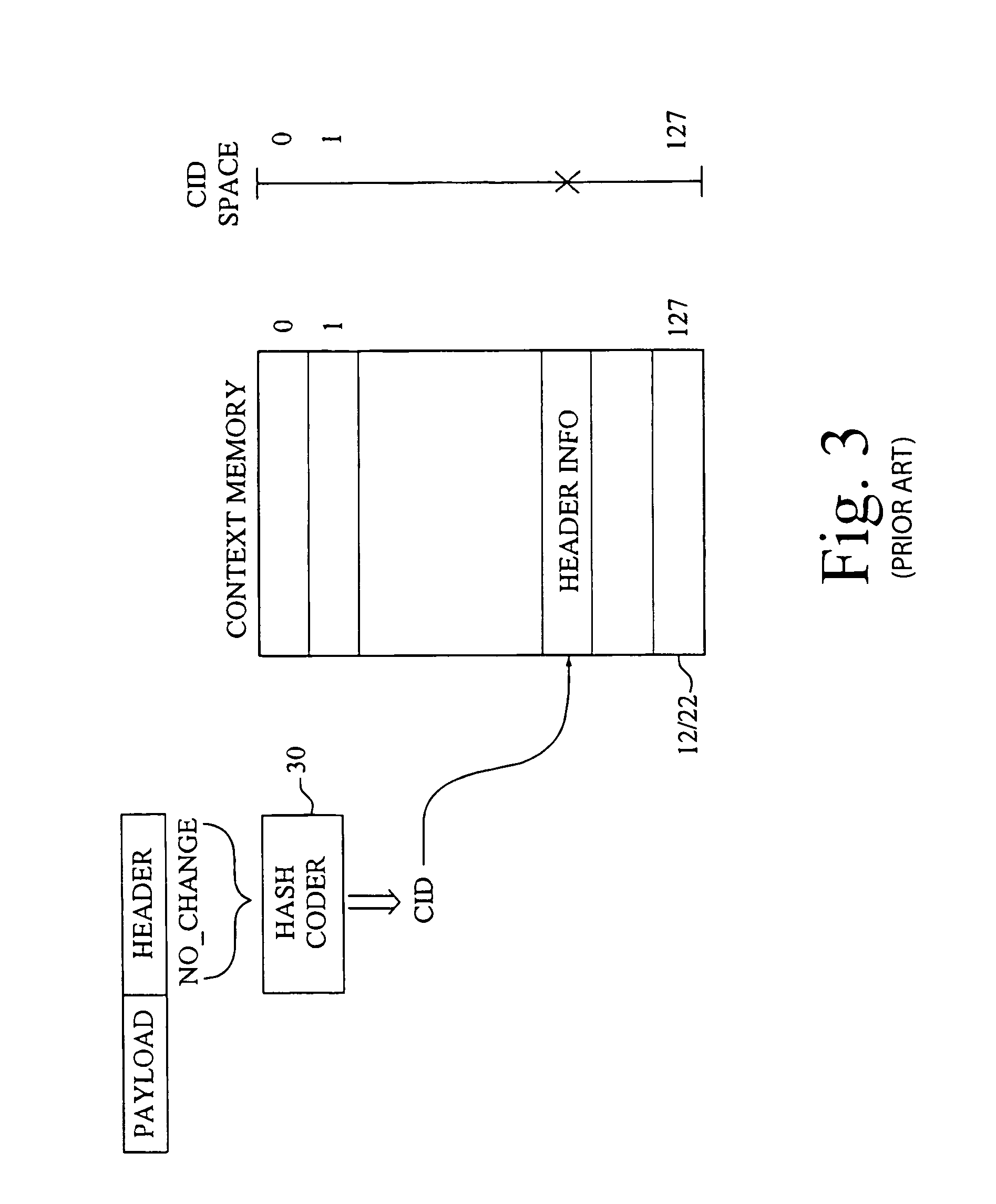Efficient mapping of signal elements to a limited range of identifiers
a signal element and limited range technology, applied in the field of mapping of signal elements to a limited range of identifiers, can solve the problems of not being able to perform functions, the risk of different elements being mapped to the same identifier is usually still considerable in many applications, and the number of hash collisions is usually still considerable, so as to improve the utilization of the available bandwidth of the link, reduce the risk of packet headers of different packet streams being mapped to the same context identifier, and cost
Inactive Publication Date: 2007-03-27
TELEFON AB LM ERICSSON (PUBL)
View PDF21 Cites 24 Cited by
- Summary
- Abstract
- Description
- Claims
- Application Information
AI Technical Summary
Benefits of technology
[0028]In particular, the invention is applicable to IP header compression and the mapping of packet streams to a limited range of context identifiers (CIDs). By means of an extended virtual CID space in which CID values are assigned from the real CID space, the risk for packet headers of different packet streams being mapped to the same context identifier can be reduced significantly. This in turn leads to improved utilization of the available bandwidth of the links used for transmitting the header compressed packet streams.
[0029]When assigning a CID value to a new session, it is important that the CID value has a low probability of belonging to an already active session. Ideally, the utilization of the CIDs is monitore
Problems solved by technology
However, hash functions are usually not capable of mapping all unique signal elements to distinct identifiers, and there is a considerable risk of different elements being mapped to the same identifier (a hash collision, also referred to as a clash).
However, the number of hash collisions is usually still considerable in many applications even though a “good” hash function is used.
The actual mechanism for generating and selecting CID values, however, is unspecified.
CID selection
Method used
the structure of the environmentally friendly knitted fabric provided by the present invention; figure 2 Flow chart of the yarn wrapping machine for environmentally friendly knitted fabrics and storage devices; image 3 Is the parameter map of the yarn covering machine
View moreImage
Smart Image Click on the blue labels to locate them in the text.
Smart ImageViewing Examples
Examples
Experimental program
Comparison scheme
Effect test
 Login to View More
Login to View More PUM
 Login to View More
Login to View More Abstract
Signal elements are mapped to a limited range of identifiers by emulating a “virtual” space of identifiers larger than the real limited space of identifiers. The larger virtual identifier space is implemented by an intermediate memory, which provides storage of identifiers assigned from the real space of identifiers. For each signal element to be mapped to an identifier, the intermediate memory is addressed by a hash value calculated from at least part of the signal element, thus allowing access to an identifier. The larger virtual space gives a better distribution of signal elements to the identifiers; and reduces the probability of different signal elements being mapped to the same identifier (“clashing”). For an efficient reduction of the clashing probability, identifiers with a low probability of being active are assigned to the intermediate memory to represent new signal elements.
Description
[0001]This application is the U.S. national phase of international application PCT / SE01 / 02746 filed 12 Dec. 2001, which designated the U.S.TECHNICAL FIELD OF THE INVENTION[0002]The present invention generally concerns the mapping of signal elements to a limited range of identifiers by means of hashing, and especially the selection of context identifiers to represent packet headers in Internet Protocol header compression, as well as cache mapping in computer systems.BACKGROUND OF THE INVENTION[0003]Hashing is a conventional technique commonly used in various applications for mapping a set of signal elements (arguments) to a limited range of numeric identifiers (keys) by means of a hash function. In hashing, a given signal element is mapped to an identifier based only on the signal element or appropriate parts thereof as input to the hash function, without any knowledge of the mapping between other signal elements and identifiers. Ideally, signal elements having the same content shoul...
Claims
the structure of the environmentally friendly knitted fabric provided by the present invention; figure 2 Flow chart of the yarn wrapping machine for environmentally friendly knitted fabrics and storage devices; image 3 Is the parameter map of the yarn covering machine
Login to View More Application Information
Patent Timeline
 Login to View More
Login to View More IPC IPC(8): G06F12/00G06F12/08G06F12/0864H04L45/74
CPCG06F12/0864H04L29/06H04L45/00H04L69/161H04L69/04H04L69/16H04L45/745H04L69/22H04L9/40
Inventor TORKELSSON, KJELLKLING, LARS-ORJANAHL, HAKAN OTTODITMAR, JOHAN
Owner TELEFON AB LM ERICSSON (PUBL)
Features
- R&D
- Intellectual Property
- Life Sciences
- Materials
- Tech Scout
Why Patsnap Eureka
- Unparalleled Data Quality
- Higher Quality Content
- 60% Fewer Hallucinations
Social media
Patsnap Eureka Blog
Learn More Browse by: Latest US Patents, China's latest patents, Technical Efficacy Thesaurus, Application Domain, Technology Topic, Popular Technical Reports.
© 2025 PatSnap. All rights reserved.Legal|Privacy policy|Modern Slavery Act Transparency Statement|Sitemap|About US| Contact US: help@patsnap.com



